Jimena N. Rodríguez joined the Department of Spanish and Portuguese in 2012, after being a Nominee for the UCLA Chancellor’s Awards for Postdoctoral Research. She is the author of Conexiones Trasatlánticas: Viajes medievales y crónicas de la Conquista en América (Colmex 2010) and Escribir desde el océano: La navegación de Hernando de Alarcón y otras retóricas del andar por el Nuevo Mundo (Iberoamericana 2018). She has also co-edited four volumes of collected essays in Colonial Literature. In 2016, Prof. Rodríguez was selected to participate in the National Endowment for the Humanities Summer Institute
seminar: “Mapping, Text, and Travel,” at the Newberry Library in Chicago. Current projects include a compilation, edition and study of the Hernán Cortés expedition to Las Hibueras, as well as a series of public digital lectures, named El mar y sus metáforas (Website: el mar y sus metáforas ). Prof. Jimena N. Rodríguez is devoted to empowering firstgeneration students from all disciplines and backgrounds at UCLA. She is a Faculty Advisor for the 1st Gen Latinx Community group, and she directs an Individual Research class, named “Te voy a contar mi historia,” a micro-oral-history-project (video/
audio) that highlights the stories and skills of first-generation students of UCLA’s Department of Spanish and Portuguese.
Books
-
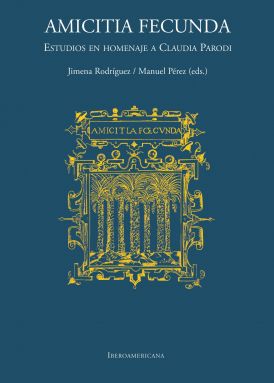
- Amicitia fecunda
- Homenaje a Claudia Parodi
- Iberoamericana, 2015
-
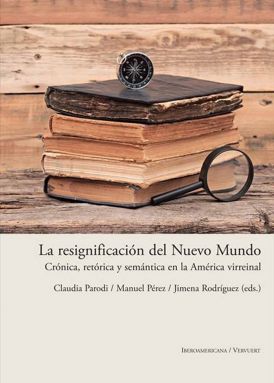
- La resignificación del Nuevo Mundo. Crónica, retórica y semántica en la América virreinal
- Iberoamericana–Vervuert, 2011
-
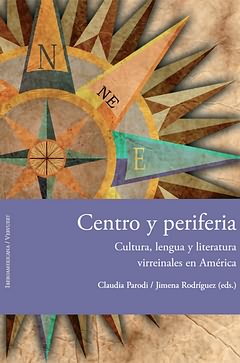
- Centro y periferia
- cultura, lengua y literatura virreinales en América
- Iberoamericana-Vervuert, 2011
-
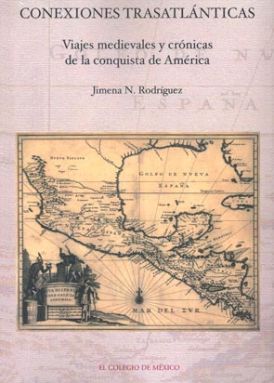
- Conexiones trasatlánticas: viajes medievales y crónicas de la conquista de América
- El Colegio de México, 2010
-
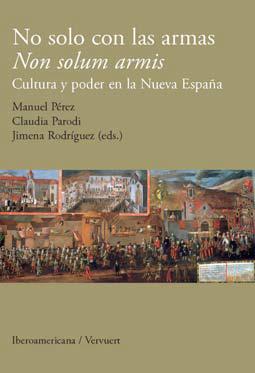
- No Solo con las Armas
- Cultura y poder con la Nueva España
-
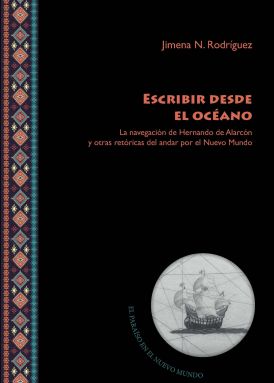
- Escribir desde el océano
- La navegación de Hernando de Alarcóny otras retóricas del andar por el Nuevo Mundo
- Iberoamericana Vervuert, 2018
Articles
- “Canoas y remos, velas y bergantines: los ausentes y los presentes en el archivo colonial”. Glocalism: Journal of Culture, Politics and Innovation. 2021, 2, DOI:10.12893/ gjcpi.2021.2.12
- “De estrechos, ancones, islas y penínsulas: California y la geografía del deseo”. Dossier: Archivo y discurso en los bordes del Imperio, Esperanza López Parada y Valeria Añón (coord.), Revista de Crítica Literaria Latinoamericana. 2021 Número 93, 1er semestre, pp.117-135.
- “Intervenciones – Primera Ronda”, Prácticas de archivo: teorías, materialidades,sensibilidades, Mario Rufer (coord.), Corpus. Archivos visuales de la alteridad americana. Vol. 10, Nº. 2 (2020) [En línea. Publicado el 21 diciembre 2020].
- “Intervenciones – Segunda Ronda”, Prácticas de archivo: teorías, materialidades,sensibilidades, Mario Rufer (coord.), Corpus. Archivos visuales de la alteridad americana. Vol. 10, Nº. 2 (2020) [En línea. Publicado el 21 diciembre 2020].
- Escribir desde el océano. La navegación de Hernando de Alarcón y otras retóricas delandar por el Nuevo Mundo. Madrid: Iberoamericana, 2018.
- “Mareantes Mareados: El estrecho de Anián y las naos a California”. Romance Notes – 55 Special Issue (2015): 133-144.
- Amicitia Fecunda. Estudios en homenaje a Claudia Parodi. Madrid Frankfurt:Iberoamericana-Vervuert, 2015. Co-edited with Manuel Pérez.
- No solo con las armas/Non solum armis. Cultura y Poder en la Nueva España. Madrid–Frankfurt: Iberoamericana-Vervuert, 2014. Co-edited with Manuel Pérez y Claudia Parodi.
- “Apuntes para una retórica del andar en el Nuevo Mundo: caminantes y navegantes”, Zama – Instituto de Literatura Hispanoamericana de la Facultad de Filosofía y Letras de la Universidad de Buenos Aires, 5 (2013): 145-152.
- La resignificación del Nuevo Mundo. Crónica, retórica y semántica en la América virreinal. Madrid: Iberoamericana– Vervuert, 2013. Co edited with Claudia Parodi andManuel Pérez.
- “Era costa brava é mal país en tierra”: caminantes y navegantes al noroeste de la Nueva España”, Anales de Literatura Hispanoamericana, 41 (2012): 45-60.
- “El viaje como relato intercalado en crónicas de la Conquista: La expedición a las Hibueras en la Historia verdadera”,
- Centro y periferia: cultura, lengua y literaturavirreinales en América (Claudia Parodi and Jimena Rodríguez eds.), Madrid: Iberoamericana–Vervuert, (2011): 59-70. Centro y periferia: cultura, lengua y literatura virreinales en América. Madrid:Iberoamericana–Vervuert, 2011. Co edited with Claudia Parodi.
- “Caminar por la mar incógnita: las naos a California y el punto de vista del navegante”.Espaciotiempo. Revista Latinoamericana de Ciencias Sociales y Humanidades. San Luis Potosí, México: Coordinación de Ciencias Sociales y Humanidades de la Universidad Nacional Autónoma de San Luis Potosí, (2011): 25-37.
- “Tamorlán y Moctezuma. El encuentro con un gran señor en la mirada de viajeros delos siglos XV y XVI”. Medievalia. México: Instituto de Investigaciones Filológicas–Universidad Nacional Autónoma de México, (2010): 5-9.
- “Los relatos de viajes hispánicos medievales y las crónicas de los primeros conquistadores: recursos compartidos”. Expresiones de la Cultura y el pensamiento medievales, Lillian von der Walde Moheno, Concepción Company, Aurelio González (eds.). México: Universidad Nacional Autónoma de México–El Colegio de México– Universidad Autónoma Metropolitana, (2010): 53-72.
- “Reconociendo los brutos la generosidad de sus amos: el vestido en el auto general de la fe de 1659”. Romance Quarterly. Washington: University of Kentucky, (2010): 105-115.
- Conexiones Trasatlánticas: Viajes medievales y crónicas de la Conquista en América.México: El Colegio de México, 2010.
Courses
SPAN 135. Maps, Ships, and Sailors: Writing the New
World from the Ocean
This class studies the figure of sailors, pilots and cartographers, and their journeys as a place of enunciation in Early Modern Colonialism. It focuses on exploring the great expeditions by sea and its most renowned navigators, as well as the expeditions of smaller magnitude, which were in charge of recognizing the ocean coastlines and the maps resulting from these routes. Throughout the quarter, this class examines the meaning of the `transportation used to cross oceans and explore coasts, and observes the ship as a locus of enunciation in texts and maps. SPAN 135. The conquest and colonization of Latin America: character Types and Literary Representations This class reads the chronicles of the first Europeans who came to
the American Continent in the 16th century not as historical texts, but as rhetorical artifacts. Following the different character-types: the wanderer, the conqueror, the cast-away, the woman, the captive, the traitor etc., students will study the different literary representations of the Latin American Colonial World. underscoring the intrinsic violence in the representation of the others.
SPAN 170. Colonial Literature in Cinema: Adaptation, Representation & History
In this class we will view Historic films or “period pieces” that offer a reevaluation of Latin America’s present by means of an exploration of its past. While some movies portray imperialism with nostalgia, others can be considered postcolonial acts of resistance. While exploring cinematic adaptations of Colonial Literature, this course analyzes, compares and relates the existing connections between cinema, literature, history and the legacy of colonialism.
SPAN 150. Re-explorations: New Perspectives on Old Worlds in Latin American Historical Fiction.
The trend towards the historical novel in recent decades is a notorious phenomenon in the history of literature in Latin America. Reviewing the premises of the historical novel, we will read short stories and fragments of novels looking for new perspectives of old worlds. The new historical fiction is characterized by a critical and demystifying re-reading or (re) exploration of the past. During the quarter we analyze some of the genre’s own narrative modes (irony, parody, burlesque, parallelism, etc.) in order to show how the writing of historical fiction is not an innocent activity, nor is the writing of History.
SPAN 197 – Direct Research / Individual Research: “I am going to tell you my story / te voy a contar mi historia…”
In this direct research we will explore different forms of writing the story of First-Generation students through critical readings, and through the exploration of different genres: chronicle; testimonio, oral history and visual stories/maps. We reflect on the concept of Identity, based on the idea that it relies on discursive mediations that both, limit and shape it. Identity does not exist a priori in culture, nor in History or substantialism (Hall, Anderson),
but rather in day-to-day experiences as a process of ‘identification’ in constant change. The final project for this class is a micro-oral-history-project (video/audio) that highlights the stories and skills of First-Generation students in the Department of Spanish and Portuguese, which aims to battle stereotypes and myths, and give visibility to those First-Generation college students and their academic success. The Center for Oral Histories & University Archives provides technical support. The final video project is submitted to the University Archives, where it is catalogued and included as part of the history of the university.
